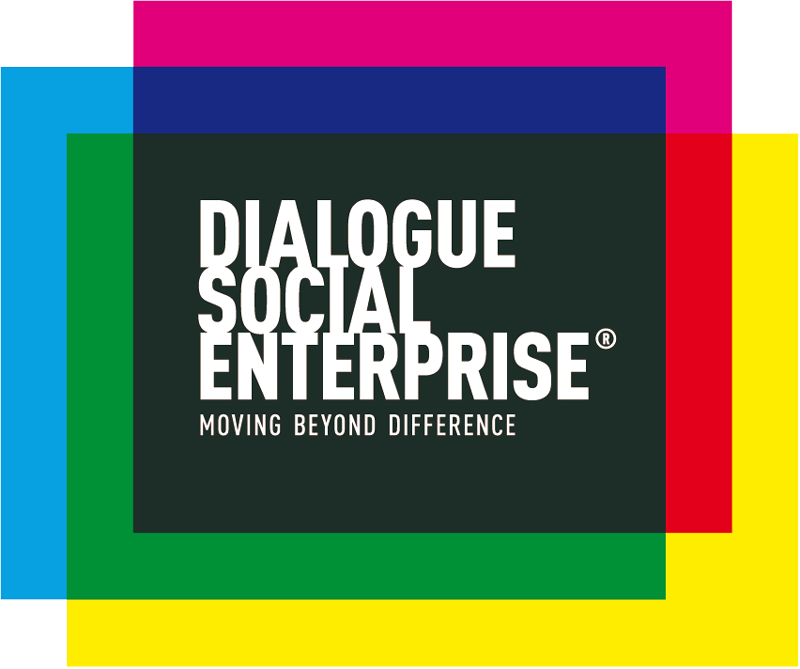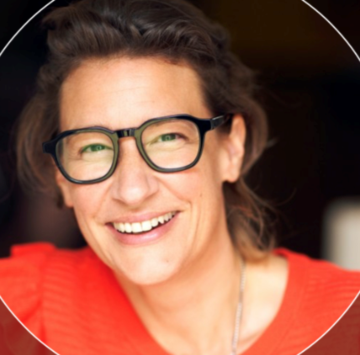It is times of change for the Dialogue organization. This month of march and after more than 30 years of leading the Dialogue initiatives, Andreas Heinecke is leaving his position as Dialogue Social Enterprise and Dialoghaus CEO.
Svenja Weber is assuming as the CEO for both organizations and therefore renovating the leadership of the Dialogue. I interview her. Get to know the new Dialogue leader.
How do you introduce Svenja Weber?
I was born in Hamburg. I am currently 47 and have two children who are 13 and 18. I am a family orientated person. I’ve tried to explore the world and went to school in Oxford, lived in Australia and Canada. I consider myself an open person and love meeting other cultures. And even I tried hard to live abroad, I came back. And that is good. I really think Hamburg is a nice place to raise a family. Not for everyone. But for me.
As a professional my branding is “I love bringing different perspectives together ” And it comes from my professional background. I started at film and commercial production. Then I moved to our family business which was an education academy which shortly later became into a business school. Working in all areas ending as an Executive Director. After that I moved to the social business sector and worked for a startup which empowered persons who were marginalized from the job market.
What has shaped your leadership?
I always wanted to impact. I realized that when, after having my first child and while working for the film production company, I was moved to work at the reception desk. That was not enough for me.
Another significant moment happened when we had to close the higher education of the business school. It was really a hard time. It was like raising a baby and then losing it.
A third turning point happened while working for the startup. It was meaningful to empower people who had been marginalized from the job market. We were taking fruits which were unused to produce juices and other products. I wanted to optimize the results and people’s potential. But it shocked me when they told me they did not want to grow more neither need more money. They were happy as they were.
And my last experience that shaped my current leadership was when I spent 8 weeks at the hospital as a result of my burnout. It took me some time to reset myself and define personal and professional priorities and to see this not as a failure of life bit as a present which allows me to sharpen myself for the rest of my future life.
Which are your lessons learned from this situations?
First one is to find balance between vision and pragmatism. I learned so upon the close of the school business. I Still believe in people who have vision. But it is needed to have partners who have a realistic view. If the market is not ready for your product it can sometimes be better to step back or wait. That happened to us, we were one step ahead the market with the focus of our business school.
Second lesson is that I learned more collaborative and inclusive leadership. The vision cannot be only yours. It happened when I wanted to optimize the startup. I had a vision in mind but the collaborators did not. There are many around which need to be included: partners and colleagues.
Finally, I learned reframing. I used to have a strong believing sentence: Have to make something excellent to have value. After all I wanted to impact and I came from an executive education field which train you to generate value. But how I reframed my believing sentence is: change is not because something is going wrong but to ensure sustainability in the future.
And how does your leadership look now a days?
I question what I do. I Learned to rethink and reframe to have many perspectives.
I also question myself not only about the what and the how but about the why I do what I do. That is connected with impact.
It is clear to me that I am not the expert although I am a leader. It needs more than one leader to get great results.
Lastly, I am not a hierarchy person and love bringing expertise together. And the way to achieve this is through collaboration and inclusion.
How did you get in touch with the Dialogue organizations?
I met Andreas in 2020. I helped Dialoghaus making a crowdfunding campaign during the pandemic and became passionate about both organizations DSE and the Dialoghaus because they have both topics I love: the educational side and the social focus.
What do you want to transmit first to the international Dialogue network?
I want to tell them I am impressed by our international community having a voice towards a more inclusive world. I want to help reaching our potential as a movement by using the great voice we have in the community we are already part of.
I consider Dialogue as a transformative movement and an intensive experiential learning method that we use to break out barriers to make the world more human. I do not pretend to change everything. My job is to insure Dialogue sustainability in the future. And as I said, want to do so by bringing together all the potential I see and make the movement louder.

